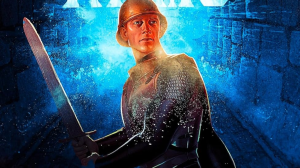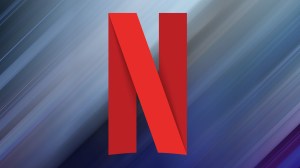The Flash is half way through its four-part series finale after tonight’s episode and on screen, the pieces are falling into place for what may very well be the biggest challenge Barry and Team Flash have ever faced. This week’s episode featured some returning faces and a couple of major revelations, all of them upping the stakes for the final two episodes. To bring these elements to life, The Flash star Kayla Compton stepped behind the camera to direct her first episode of the series and ComicBook.com recently spoke with the Allegra actor about what it was like to take on such a significant episode in the series’ run, the horror elements she brought to the episode, and what it’s been like to be on this journey with her character.
Videos by ComicBook.com
Warning: Spoilers for this week’s episode of The Flash, “A New World, Part Two”, beyond this point.
Nicole Drum, ComicBook.com: When did you decide that you wanted to direct an episode of The Flash?
Kayla Compton: Well, I’ve always been interested in directing, and I’ve written and directed and acted in my own little projects before this. And so pretty much as soon as I booked the show and joined in season six, I expressed interest in directing, not knowing that it would actually result in an episode, but Eric was very kind and allowed me to shadow. So, I ended up shadowing three times, which led to me deciding to write and direct a short film, which allowed me to get into the Warner Brothers TV directing program, which then I think convinced Eric that I could be trusted with an episode. And so, it was pretty much from the beginning that I wanted to do it and I just feel so fortunate that I was able to slide in and get an episode at the very end there.
You’re not getting just any episode here; you’re getting not just an episode in the final season but an episode in the four-part finale. On top of that, this one has even more significance because of what happens in the episode and the character that comes back and the breadcrumbs fans get. So many things connect with this episode. When did you find out that you’d be getting such a significant episode?
I don’t know if that was the plan exactly from the beginning, but I think the idea at the beginning of season nine was, “Hey, why don’t you shadow one more time? Have some conversations with Vanessa, who is our supervising director, and hang out, take notes, do as much as you can in order to prepare for an episode during the second half of the season.” I think was the idea. And then it just so happened that I got episode 11. I actually was originally supposed to direct episode 10, but because of scheduling things or something with Eric, I ended up having to switch with him.
So, I got episode 11, and I don’t think it really even hit me until I started reading the scripts and then we were told it was a four-part finale, and I just went, “Oh my God, I’m directing one of these final episodes.”
There’s so much that goes on in this episode. We get that reveal about Khione, which is exciting. We get the return of Eddie Thawne and the whole Malcolm-potentially-Cobalt-Blue of it all. We get Iris going into labor. How do you approach something like this?
It’s definitely packed. It’s such a well-written episode, though. So, when I got the episode, I felt relief because it’s just so well written. It was a lot of collaboration. Pre-production was jam packed. We had a lot to discuss, and everyone putting their heads together on how can we make this happen, how can we make our days, how do we make sure we honor this jam-packed script and do it well? So, I would say we really tackled that in pre-production, myself, the writers, and all of the departments getting together. And so, I think by the time we were ready to film, we all felt prepared in that way.
I recently spoke with Danielle Panabaker, who has directed a number of episodes of The Flash, and I told her that, as a viewer, I have always found it really inspiring to see the female stars of various Arrowverse shows stepping behind the camera on their own shows and now you’re the latest to do that. And when I was talking to her, I got the impression that she was really proud of you for doing this. Did she have any advice for you?
Danielle has been a champion of me from the very beginning. I shadowed Danielle, so she had a lot to say during her episode. I was there with her all throughout craft and all throughout production. So, I learned a lot of her tips and tricks. And so, she was there every step of the way for me, really pushing me, convincing me sometimes that I could do it, even when maybe I didn’t believe it. And then, so by the time it was my turn, I think she was like, “You’re ready. You got this. You’ve learned well, grasshopper.”
What was the biggest challenge for you… because it’s very different from being a performer who knows the characters and knows that side of thing and then stepping behind the camera. What for you was the biggest challenge in doing that?
It was very challenging to do both together. I’m still in the episode, and actually on our very first day, the very first scene is the first scene that you see in the episode that I’m in, and it’s a big group scene. And there was a lot to do and it was my very first team ever directing on this scale. And so, it was extremely hard and very daunting. So that was actually the most challenging part. But other than that, I think it was just stepping into the role of leader in a new way, in a way that you don’t necessarily have as an actor. And that was exciting. It was challenging, exciting, fulfilling, rewarding, all of it.
What did you most enjoy about the experience?
I most enjoyed the actual putting together of the movie. I don’t know if that makes sense.
There’s a lot of politics that go on. There’s a lot of dealing with people. Those are the harder parts in directing an episode. The actual making of the episode in between action and cut are the most fun parts. And going through editorial was incredible. I love editorial. And that was also one of the most fun parts for me.
I have to ask, I know when I’ve spoken with other directors, sometimes they’ll talk about how they were inspired by other things they’ve seen or love when approaching their project. Did you have any particular inspirations when approaching this episode?
Yeah, with the horror aspects, the DP and I had a shorthand where we called all of our horror shots the Mike Myers shots. So that was a big inspiration. And then not so much horror, but another big inspiration from this was Blade Runner 2049. That was something I went in thinking maybe we can subtly nod to this bit. It was a big inspiration.
As we know, The Flash is coming to an end and for you, you’ve been there since Season 6 and we’ve really seen Allegra grow and go on this incredible journey over her seasons on the series. For you, what has it been like to do this journey with Allegra and what are you going to take away from this now that you’ve gotten to be a superhero on TV?
Yeah, the journey has been incredible. Like Allegra, I feel like I’ve grown so much. Allegra sort of becomes this superhero that I don’t know if she would’ve ever imagined herself being when we’re first introduced to her. And I feel similarly. I feel like I’ve grown as an actor and as a person, as a worker in a way that I never would’ve imagined. I got opportunities that I never could have imagined having. So, I just feel incredibly grateful, so proud of the show. It is bittersweet. It’s sad to say goodbye, but I was telling someone earlier, this will live forever. Whether it’s on Netflix or wherever, this thing that we created lives on and we can always go back and look at that and treasure it, which is really incredible.
The Flash airs Wednesdays at 8/7c on The CW.








